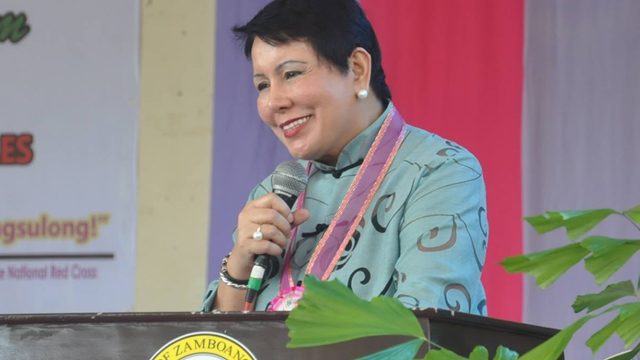SUMMARY
This is AI generated summarization, which may have errors. For context, always refer to the full article.

MANILA, Philippines – The Sandiganbayan filed graft charges on Wednesday, August 3, against 5 people – including Zamboanga del Sur Representative Aurora Cerilles.
This was in connection with alleged irregularities in a contract Cerilles approved in 2008 when she was provincial governor.
Graft investigators said the P15-million procurement contract the former governor and the Bids and Awards Committee gave to Willstrong Becker Philippines for 40 sets of solar streetlights – was done without conducting the required public bidding.
The lights were meant to be installed at Dumalinao, in Zamboanga del Sur.
The named co-defendants of Cerilles, according to information prepared by assistant special prosecutor Anna Leah Y. Tiongson-Mendoza and approved by Ombudsman Conchita Carpio Morales last June 10, were Provincial Bids and Awards Committee (PBAC) members Rino D. Soria, Mark Anthony S. Padayhag, Wenefreda M. Cañada, and Evelyn T. Panuncialman.
The street lights were paid for via the Priority Development Assistance Fund allocations of former representative Antonio Cerilles, husband of Aurora.
Auditors questioned the direct contracting procedure, as this was a violation of the Anti-Graft and Corrupt Practices Act. The direct bidding gave unlawful preference to Willstrong Becker Philippines.
The timeline leading to the transaction was also suspect. The submission of the price quotation by the supplier, the convening of the PBAC , the submission of the resolution recommending the contract be awarded to Willstrong Becker, and the approval of the procurement by then governor Cerilles were done on the same day – March 11, 2008.
The prosecutors added, “It took the procuring entity only 3 days to consummate the transaction from the date Willstrong submitted its quotation.”
Cerilles was, in 2012, also charged with graft. This charge came from allegations that she approved an irregular purchase of P6.88 million in medical supplies in 2001 as the sitting governor.
The PBAC and private suppliers were also named co-accused, though this case was junked in 2014 due to a technicality – the defendants cited an inordinate delay in due process.
The court ruled in favor of the defendants at the time. It said the Ombudsman violated the defendants’ right to due process because the Ombudsman took 8 years to indict them based on a case filed in 2004. – Rappler.com
Add a comment
How does this make you feel?
There are no comments yet. Add your comment to start the conversation.